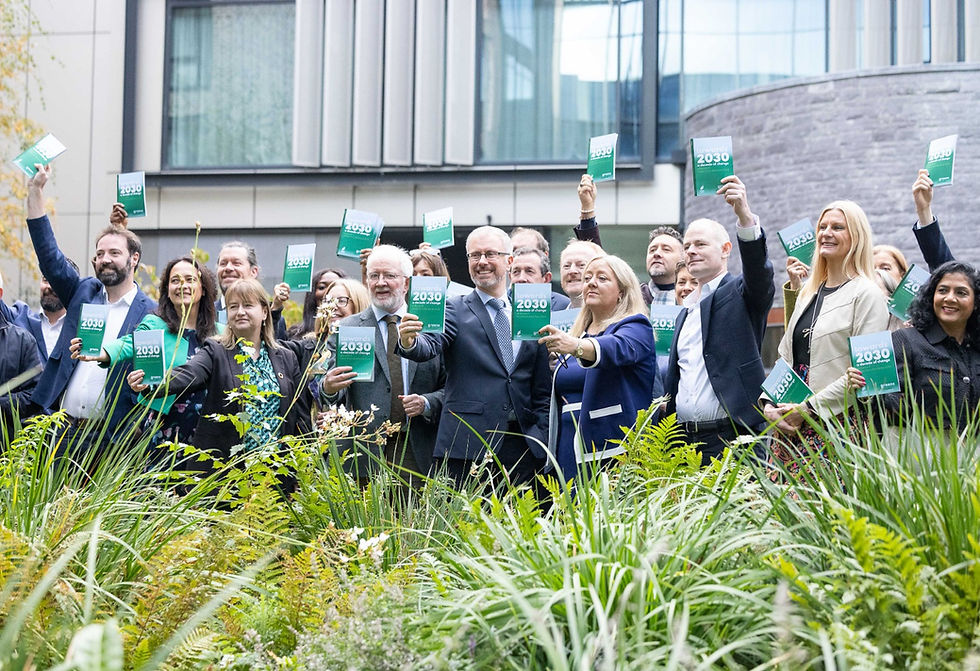Science Week speech delivered by Minister Noonan
- Malcolm Noonan
- Nov 11, 2021
- 3 min read
Yesterday, to mark Science week, I delivered a speech to Dáil Éireann on the importance of science in informing climate and biodiversity policy. Below you will find Part 1, Part 2, and the full text of what I had to say.
Part 1 of speech:
Part 2 speech:
Is é eolaíocht an modh ina dhéanfainn daonnacht ciall as an domhain, an cruinne agus cinnte é féin.
Science is the method through which humanity makes sense of the world, the universe, and indeed itself. It is a process of enquiry and experiment that combines curiosity, creativity and collaboration with rigourous interrogation to shed light into dark corners, illuminating the realities of nature through an iterative process of understanding. It is, in no small part, one of the reasons why our species has become so successful on this planet. And it is also the key to solving the challenges associated with the unforeseen consequences of that success, climate change and biodiversity loss, which threaten the future of our species, and countless others.
Carl Sagan, arguably the greatest science communicator of our times, wrote in his seminal book, Cosmos, that “Our passion for learning is our tool for survival”.
As Minister for Heritage, which includes biodiversity and nature, earth’s life-support system that underpins human societies and economies and provides the ecosystem goods and services that we are entirely dependent on, I am all too aware of the significance of this. Science has made plain the scale of the impact that we are having on the natural world, and the unconscionable likely future if we continue as we are. It has also made plain what we must do to get off this track.
We need action on biodiversity in order to make the supply of ecosystem services like soil fertility, water and air purification, carbon sequestration and flood mitigation more resilient to climate change: healthy ecosystems are better able to resist and recover from the impacts of climate change, like fires, floods, droughts, pests and diseases. We also need to ensure that climate-related transitions in energy and land use actively support biodiversity, that nature-based solutions are deployed to contribute to climate mitigation and adaptation, and that we develop solutions that address both biodiversity loss and climate change simultaneously in order to resolve conflicts and maximise synergies.
None of this is possible without scientific evidence to support impactful policy, and that requires targeted funding for academic research and scientific training across a range of areas, not least in ecology and biodiversity conservation. The web of life is more complex than most of us can even begin to imagine. As just one example, we have 11,000 species of insect in Ireland, but we know precious little about them or the vital roles they play in the web of life, or what might happen to the way an ecosystem works if one, or several, or many, were to disappear.
In my Department, the National Parks and Wildlife Service benefits from the expertise of many scientific, technical and conservation ranger staff with scientific backgrounds. It publishes numerous scientific publications and reporting outputs, currently supports a range of scientific research initiatives. These include co-funding of the 2021-2022 Biodiversa Joint Transitional Call on supporting the protection of biodiversity and ecosystems across land and sea, partnering on the EU Horizon 2020-funded WaterLANDS project which aims to co-design restoration with communities, and collaborating with the Irish Research Council to progress research in key areas such as biodiversity finance. We will also be providing financial support to the new All-Ireland Climate and Biodiversity Research Network, which was launched by an Taoiseach this week.
My Department also contributes to scientific education and outreach in other ways, not least through our work on the Heritage in Schools programme through the Heritage Council, our support for the Green Schools Programme through An Taisce, and the brilliant work done by our own NPWS Education Officers through their outreach programmes, which engage, inspire and connect communities with the wonders of the natural world around them.
Furthermore, it is my intention that ‘Review, Reflect, Renew: A Strategic Action Plan for the future of the National Parks and Wildlife Service’, which is currently in development, will provide for a much greater focus on biodiversity and ecosystem services research, and also for wider scientific and educational outreach.
It is my firm view that we must harness the passion for learning wherever we find it – in our communities, our places of work, our primary and secondary schools, our colleges and universities, and most especially in our research institutions – and channel it, with support and resources, towards the achievement of our collective goals to live well and equitably within the environmental limits of this planet.



Comments